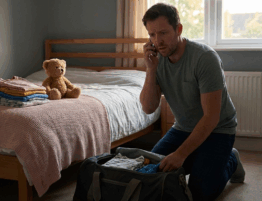Deciding how your child will be educated after a divorce can be challenging, especially when one parent wants to homeschool their child. In Arizona, questions surrounding legal decision-making, parenting time, and educational rights can become complicated when parents are no longer in agreement.
Whether you’re currently homeschooling, considering homeschooling, or contesting your ex-spouse’s decision to do so, understanding how Arizona divorce and child custody laws impact educational choices is crucial. This article explains what the courts consider, the legal rights each parent holds, and how to handle disagreements over homeschooling — all from the perspective of Arizona family law.
Here’s what this article will cover:
- Educational Decisions and Legal Decision-Making in Arizona
- What If One Parent Wants to Homeschool and the Other Doesn’t?
- Joint vs. Sole Legal Decision-Making: How It Impacts Homeschooling
- How Arizona Courts Evaluate the Child’s Best Interest in Education
- Amending a Parenting Plan to Address Homeschooling
- FAQs About Homeschooling After Divorce in Arizona
- Contact a Family Law Attorney From the Law Offices of Daniel Hutto
At the Law Offices of Daniel Hutto, we assist parents throughout Maricopa County and Pinal County in understanding their rights and protecting their children’s best interests in custody and education-related disputes. This guide will provide you with the legal knowledge and practical tools to navigate homeschooling issues after divorce.
How an Arizona Family Law Attorney Can Help
Our Phoenix Family LawAttorneys are Here to Help!
Educational Decisions and Legal Decision-Making in Arizona
In Arizona, decisions regarding a child’s education fall under the category of legal decision-making authority. This refers to the right to make non-emergency legal decisions on behalf of a child, including those related to education, healthcare, and religious matters. Arizona Revised Statutes § 25-401 defines this term clearly in the context of family law.
Legal decision-making can be joint (both parents share responsibility) or sole (one parent makes all the decisions). The parenting plan or custody order entered during the divorce proceedings will state which type applies. If homeschooling is not addressed in the divorce decree or parenting plan, and both parents share joint legal decision-making, then both must agree to homeschool.
This legal structure helps protect the child’s right to consistent, agreed-upon educational standards. It also prevents one parent from unilaterally making significant decisions without the other’s consent when joint legal custody is in place.
What If One Parent Wants to Homeschool and the Other Doesn’t?
A common point of conflict after divorce arises when one parent wishes to homeschool, but the other disagrees. This disagreement can become a legal matter if the parents share joint legal decision-making. Since educational choices fall under this authority, homeschooling cannot begin unless both parents consent.
If a disagreement arises, the parent who wishes to homeschool must petition the court to modify the current legal decision-making arrangement or resolve the conflict through mediation. Arizona family courts will evaluate the request by determining what is in the best interest of the child.
Real-world example: A parent in Mesa decides to withdraw their child from public school to begin homeschooling mid-year. The other parent objects, citing concerns about curriculum and social interaction. Since they have joint legal custody, the court steps in and ultimately denies the homeschooling request, not because homeschooling is inherently bad, but because the child was already well-adjusted at school and the disruption was not in their best interest.
Joint vs. Sole Legal Decision-Making: How It Impacts Homeschooling
The type of legal decision-making arrangement plays a direct role in whether a parent can homeschool without consent:
- Joint Legal Decision-Making: Both parents must agree on major educational decisions. One parent cannot enroll or withdraw a child from public or private school without the other parent’s agreement. Homeschooling must be mutually approved or settled by court order.
- Sole Legal Decision-Making: The parent with sole authority can choose to homeschool without the consent of the other. However, even in these cases, courts may intervene if the other parent believes the decision harms the child or violates the terms of the parenting plan.
It’s important to note that physical custody (or parenting time) does not grant the right to make educational decisions. For example, a parent who has the child 60% of the time still cannot choose to homeschool unless they also have the relevant legal decision-making power.
Courts in Arizona generally prefer joint legal decision-making unless there is evidence of domestic violence, child abuse, or an inability of the parents to cooperate effectively.
How Arizona Courts Evaluate the Child’s Best Interest in Education
Under Arizona law, the courts apply the “best interest of the child” standard to resolve disputes over education and other matters involving legal decision-making. ARS § 25-403 outlines the factors courts must consider when making these determinations. When it comes to homeschooling, courts may examine:
- Each parent’s ability to provide academic instruction
- The proposed curriculum and educational resources
- Socialization opportunities for the child
- The child’s previous academic performance
- The impact of homeschooling on parenting time and schedules
- Any evidence of neglect or improper supervision
Suppose a parent has a history of failing to comply with court-ordered education standards, such as not registering with the Arizona Department of Education or using an inadequate curriculum. In that case, the court may be hesitant to approve homeschooling.
Conversely, suppose the parent proposing homeschooling has a strong educational background, a clear plan, and a track record of responsible parenting. In that case, the court may find that homeschooling serves the child’s best interest.
Amending a Parenting Plan to Address Homeschooling
If your current custody order or parenting plan doesn’t mention homeschooling or education, and you foresee a potential conflict, it may be time to modify the order. Under Arizona law, either parent can file for a modification if there has been a material change in circumstances.
Steps to take include:
⑴ Gather Evidence – Prepare documentation that shows how the homeschooling arrangement benefits your child, including lesson plans, accreditation materials, and details about socialization opportunities.
⑵ File a Petition – Submit a petition to the court requesting a modification to your current legal decision-making order or parenting plan.
⑶ Attend Mediation or Hearing – Depending on the county, you may be required to attempt mediation before a judge will hear the case.
Real-world example: In a Pinal County case, a father sought to prevent his former spouse from homeschooling their 9-year-old daughter, claiming it would interfere with their established routine and parenting time. The mother filed a modification request, presenting an approved curriculum and letters of support from a homeschool co-op. The court ultimately sided with the mother, amending the parenting plan to reflect shared agreement on homeschooling with specific educational benchmarks.
FAQs About Homeschooling After Divorce in Arizona
Can I homeschool my child if I have joint legal decision-making?
No, not unless the other parent agrees. Educational decisions require joint consent under joint legal decision-making.
Does homeschooling affect child support obligations?
Not typically. Child support in Arizona is calculated based on income and parenting time, rather than the location where the child receives education. However, significant schedule changes could indirectly affect support calculations.
Can the court deny homeschooling even if I have sole legal decision-making?
Yes, if the court determines that homeschooling is not in the best interest of the child, especially in cases involving previous neglect, child abuse, or failure to meet state homeschooling requirements.
What if my ex-spouse starts homeschooling without my consent?
If you share joint legal custody, you can file a petition to enforce or modify the legal decision-making order. The court may intervene and issue temporary or permanent orders.
Do I need to register my homeschool with the state after divorce?
Yes. Arizona requires homeschoolers to file an affidavit of intent to homeschool with the county superintendent, regardless of marital status.
Is homeschooling ever court-ordered during divorce?
Rarely. Courts do not typically mandate homeschooling, but they may approve or reject it as part of a broader parenting plan if both parents raise the issue.
What happens if my ex uses homeschooling to limit my parenting time?
You can challenge this in court. Parenting time is separate from legal decision-making, and courts do not allow one parent to use educational decisions to alienate the other parent from the child.
Contact a Family Law Attorney From the Law Offices of Daniel Hutto

Decisions about homeschooling after divorce often lead to conflict and confusion. You may wonder about your rights, how to protect your child’s education, or how to prevent your ex from making unilateral changes without your input.
At the Law Offices of Daniel Hutto, our team understands the complex legal and emotional challenges associated with divorce and child custody matters. We can help you:
- Modify an existing parenting plan to address homeschooling
- File for sole legal decision-making if justified
- Mediate disputes between parents over education
- Represent you in court to protect your child’s best interests
Attorney Daniel Hutto brings years of experience in Arizona family law, having handled cases involving joint custody, homeschooling, domestic violence, and modifications. He knows how Arizona courts handle these issues — and how to present your case in the most effective light.
We offer free consultations so you can speak with a knowledgeable family law attorney one-on-one. Call us today at 602 536-7878 to schedule your free case evaluation.












